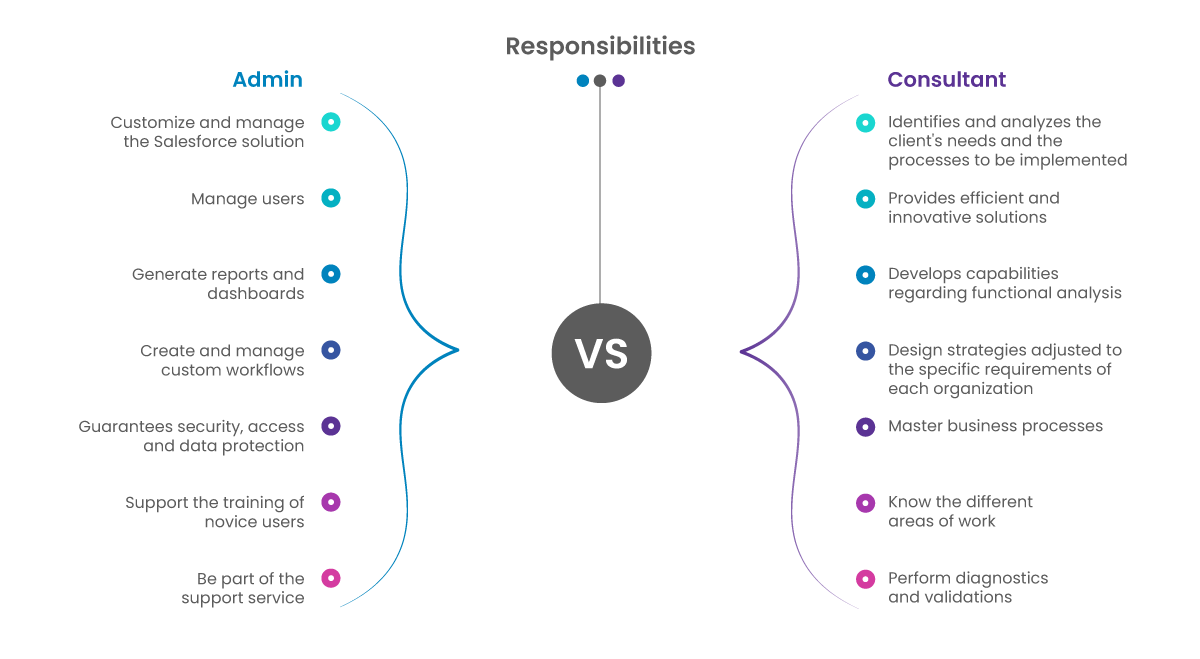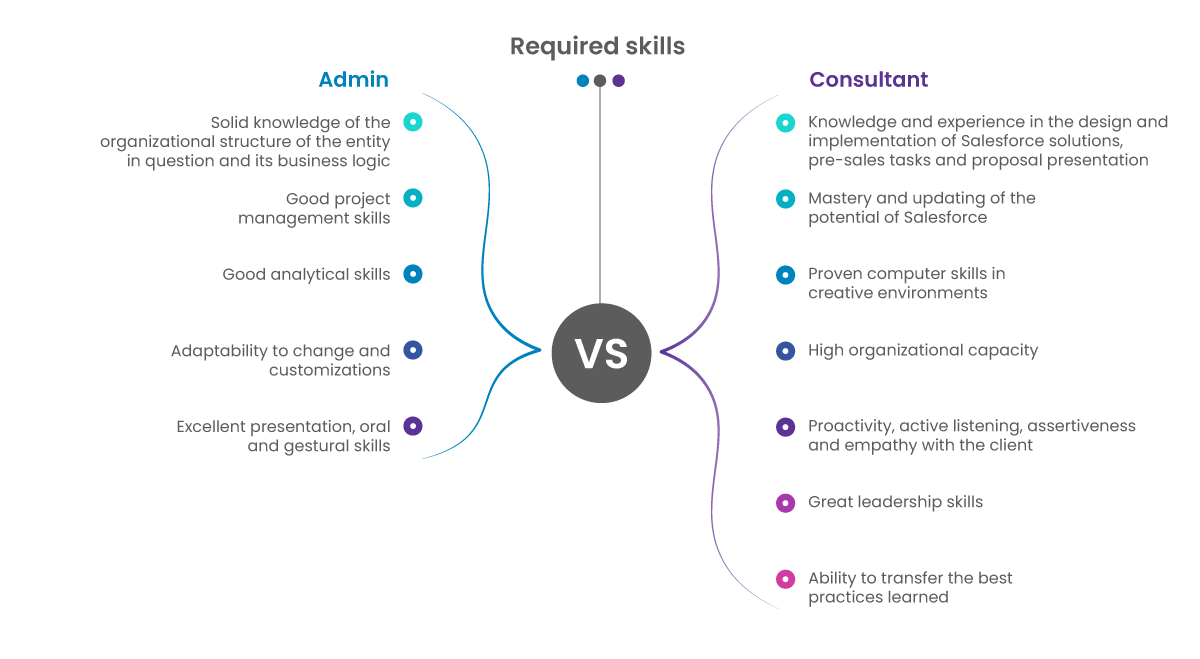There are already more than 150 thousand organizations that use Salesforce as a cornerstone in their daily operations. Much of the success of a CRM in an organization is due to its correct implementation and the professionalism of the team responsible for it. There are several roles within a Salesforce team, however, the Consultant and Administrator roles tend to cause confusion when defining their functions. To clear up any doubts, let us start with the basics: who is who and what are their roles?
Salesforce Admin vs. Salesforce Consultant: Who’s Who?
As we explained in previous articles, a Salesforce administrator is a person who knows a CRM like the back of their hand. They master the nitty-gritty details of the platform while taking on multiple roles which include general administration, business analytics, and professional training support.
There are also those known as “accidental administrators” who, as their name suggests, enter this role by accident or chance. These are typically people with proven IT skills and abilities who are looking for a change in role or are eager to learn about Salesforce. They may have also had previous CRM management experience. However, even if they have good qualities, any organization must ensure that this person really knows what they are doing so that they do not cause potential damage to the business.
In contrast, a consultant is a person or agency whose goal is to implement and optimize the Salesforce platform in an organization. They are responsible for the entire platform implementation process: from the conceptualization of the solution to its adoption by the organization and its users. During this stage, the consultant is closely connected to the client. They must understand the client’s processes and how to materialize them in the CRM, define what can be done with the declarative implementation, understand what is possible with the version of the Platform, and what work needs to be done by the developers.
In other words, they control the functional analysis and implementation of the platform by both being able to identify the necessary requirements, and provide an adequate technical design of the solution and its correct configuration. Doing so in order to guarantee the maximum use of the potential of Salesforce. To do this, the consultant must participate in the definition of objectives, budget allocation, identification of KPIs, creation of the implementation plan, testing and validation, and other tasks. It is important to note that in addition to having a vast knowledge of CRM, they must have proven business knowledge.
Responsibilities of each role
Although described above in a general way, it is good to be clear about what we can expect from both a Salesforce consultant vs admin.

Salesforce Admin
- Customizes the solution according to the specific needs of the organization by applying configuration changes.
- Manages the users of the organization.
- Generates Salesforce reports and dashboards to make it easy to find key information.
- Create and manage custom workflows.
- Guarantees security, access, and data protection.
- Are a part of the training and coaching of beginner users in the CRM platform; as well as the support service of the organization.
Salesforce Consultant
- Identifies and analyzes the client’s needs and the necessary processes to implement.
- Provides efficient and innovative solutions.
- Builds capabilities regarding functional analysis of Salesforce.
- Designs strategies adjusted to the specific requirements of each organization to guarantee the success of the project in the long term.
- Master business processes.
- Learn about the different areas of the platform to create an effective work methodology.
- Perform diagnostics and validations.
Required skills
Skills are another point of reference to take into account to differentiate both roles.

Salesforce Admin
- Solid knowledge of the organizational structure of the entity in question and its business logic to build solid relationships with key audiences.
- Good project management skills, as well as analytical skills, to make changes and customizations when needed.
- Excellent presentation, oral communication, and gesture skills. They should have a motivating style when dealing with various types of audiences.
Salesforce Consultant
- Knowledge and experience in the design and implementation of Salesforce solutions.
- Handle pre-sales tasks and presentation of proposals to clients.
- Mastery of the potential of Salesforce as a CRM and maintaining their knowledge of the platform. To clarify, they must know what can and can’t be done in a standard way according to the latest release.
- Proven computer skills in a creative environment that is not limited to classic IT functions.
- High organizational capacity and proactivity.
- Active listening capacity with assertive communication and empathy with the client while also having great leadership skills.
- Ability to transfer their knowledge of the best practices they have learned in previous consulting experiences towards a new client.
Other differences between both roles
Here are some additional details that can help when deciding between these roles:
Time
Generally, an administrator works continuously within or with the organization. This leads to a longer business relationship. In contrast, Salesforce consultants are generally external to the organization and, therefore, these relationships often only last for the time set for project implementation. Unless the organization chooses to remain associated with the consulting partner, the relationship is short-lived.
Costs
The duration of the relationships between the organization with administrators and consultants determines the cost. Administrators, as continuous workers, originate the overhead costs associated with hiring an employee. For their part, consulting partners are generally only billable on time spent on a specific project, either by the hour or by time-limited contracts.
Knowledge
Administrators stand out for having a more general and in-depth knowledge of CRMs, since their work tends to be more specific. Consulting partners, in addition to platform knowledge, are proficient in business trends and business technology. This combination optimizes the power of Salesforce through the best integrations. Likewise, consultants can opt for a specialization in one or more aspects of CRMs.
Changes, integrations, and customizations
Changes, integrations, and customizations are frequent during implementation due to Salesforce being highly dynamic and adaptive. An administrator is more likely to adapt and execute change quickly on the fly. On the contrary, consultants follow the designed plan to the letter and may not be prepared for a change in the middle of implementation.
In conclusion, the choice between a Salesforce administrator or consultant really depends on the particulars of your organization such as its goals, needs, and budget. These roles are not mutually exclusive and can co-exist in the same organization. There are times when having both is ideal. In practice, there are many cases of overlap and complementation between both of these roles. In any case, SkyPlanner, as a Salesforce consulting partner, has proven experience and guarantees a certified work team in both roles. You can contact us at hello@theskyplanner.com.



